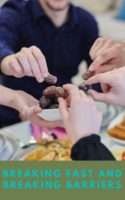Racial segregation was used for centuries to divide people all around the world. In South Africa, the racist system known as apartheid changed our history. Sanelisiwe Daniso (17) shares with us how the past can still haunt young South Africans.#VoicesOfYouth #YChallenge #30StoriesIn30DaysWeCan24
Sanelisiwe was born in the Eastern Cape, she was the last born of four children – one brother (17) and two sisters (13 and 11). “I was born in 1999 and my dad died in 2000, so I can’t remember him. I only know him from pictures and what my mom and sisters have told me. He was a strict person, the breadwinner and he worked in Cape Town. They only saw him in December when he would bring Christmas clothes. My family talked about those occasions with fondness.
“We lived in a small village. I could go anywhere, it was such a peaceful place, we all knew each other. After my dad passed away things became tough at home. My mom did not finish school because she married young and she was not working, so we struggled financially. Relatives assisted us with money and groceries.
“One of my middle sisters moved to live with my uncle and the two elder children remained with my mom. When I was five years old my aunt took me to live with her. She came and visited us, she had a son who was of a similar age to mine and she could observe a big difference in development between the two of us. She told my mom that I needed to learn how to speak English and she would enrol me in a ‘white’ school if she would allow me to go with her.
“I moved in with my two aunts, they were both teachers. They taught in the rural area but they had a house in the city (East London) so that their children could study in better schools – ‘white schools’ as we called them. Only children lived in the house full-time, we were six children – myself and my cousin (5); two other cousins that were twins (13) and the two eldest (19) that were studying at University. Besides the six of us, there was a nanny (25), she was a family friend that finished high school and this was her first job. My aunts would visit on weekends and would bring the groceries for the following week.
“The eldest aunt became like my mom, so I did not miss my mom a lot. I talked to my mom over the phone on the weekends, so we kept in contact. I remember this time of my life as a good one, we all liked each other. I just had issues with my younger cousin (who is the same age as me), he was obsessed with wrestling and he would always hurt me and make me cry.”
After some time, Sanelisiwe’s mom moved to Cape Town to find a job.
“My mom moved to Cape Town and when she felt she was stable she tried to reunite the family. She asked me to join her, I was eight years old at the time. My brother also joined her together with my sister’s daughter (1). My mom felt she could take care of the baby in a better way. My two sisters remained in the Eastern Cape, one to finish high school and the other one because she had gotten used to living with my uncle’s family and come to see them as her own family.
“I had mixed feelings about the move. I had gotten used to my life in my aunt’s house and I liked it, but at the same time my mom was waiting for me in Cape Town.
“When I arrived things were very different to anything I had experienced before. My mom was a cleaner at Shoprite and we lived in a shack in Khayelitsha (site B). All my life I had lived in a house, now if it rained we needed to put buckets inside the shack to prevent it from being wet. There was no bath and the only toilet was outside on the yard. In Eastern Cape, I used to move around in cars but now I needed to use trains that were so full I hardly could feel my feet on the ground. Besides structural differences, Cape Town felt very unsafe. In the mornings, I would hear people screaming in the streets because they had just been robbed. It was tough but with time we all adapted.
“My mom wanted to continue giving me a good education, so she found a school in Mitchells Plain for me. In our communities, people believe that the education in coloured and white communities is better than what schools offer in black townships. Everyone felt the sacrifice was worth it, even though it would take me one hour of travelling to reach school – because many kids would be collected on the way – and it was more expensive.
“The family developed a daily routine to keep everyone safe. My mom needed to be at the train station at 05:00 am because it took her two hours of travelling to reach work. For security reasons, she would put her cell phone in her doekie* to hide it from gangsters and she would walk with my brother to the station. They would leave us with a neighbour until my brother was back. He would help us to get ready, I would wait for my transport to school and after he would take the baby to crèche.
“I liked my school and made friends easily, there were Afrikaans and Xhosa-speaking students but did not really matter we were all close friends independent of our racial background.”
At the age of 13, Sanelisiwe started seeing the world through a different lens.
“All my life I had attended mixed schools, I knew that we looked different but I never cared about it. I felt equal to everyone else. But at the age of 13, I began paying attention to the conversations grown-ups had around me. For example, people would say white people should not be trusted, they have robbed us. They said black people are suffering because of them and they would blame everything that was wrong into Apartheid.
“Their conversations would continue to say that if a black person is successful, it is because they are corrupt. Honest black people are doomed to be cleaners or cashiers or any other mundane job.
“I became so angry and frustrated; I saw the world through their lens. I began to question the meaning of going to school if I would only amount to be a cleaner and as a result, my school marks suffered.
“I stopped mixing with kids from different racial backgrounds and I only spent time with kids of the same race. Language like ‘us’ and ‘them’ became part of my daily vocabulary. I would not pay attention in class to any teacher that was not black. If school staff from a different race would reprimand a black child for misbehaving, I would always support the black child independent of the reason. I felt that he/she was being treated unfairly and I was certain the other racial groups were trying to hunt us down. After all they had done it for centuries.”
Sanelisiwe says that she became a completely different person in her last year of primary school and that it was the move to a different high school that helped her find herself again.
“In the beginning of high school, Grade 8 (14), I moved to another mixed school. I was new and began attending extra-mural activities. The programmes I participated in had a lot of discussions and debates and they challenged my mindset. I started developing my opinion based on my own experiences and not in the experiences of others. I stopped blaming the system and learned about taking responsibility for our own actions.
“In Grade 9 I changed, I slowly opened up to children of different races. I remember an occasion where I shared my food with a coloured girl. We ate from the same container, I realised that she did not have any problem with me. It was my mind that was telling me, she must think she is superior and that made me feel inferior. We became best friends, equals and I even visited her home and had a good relationship with her family.
“I accepted everyone, my marks got better because I would ask assistance from anyone that was doing good at school. I began paying attention to all teachers and to regain my confidence that I can be a successful and honest black person. I have been on the top ten list of students since then.
“I believe South Africans sabotage themselves, I speak from experience because I almost fell for the trap myself. The burden that we carry as a nation, all the pain and scars make us look at everything through the lens of race. South Africans need to heal and stop transferring the pain and the hate to younger generations. In this day and age, no child should grow up to become racist. We should be more mindful in how we speak about each other… We should see each other as assets and not liabilities.”
***
Salesian Life Choices is an enterprise working towards human profit. We give youth in the Cape Flats (Cape Town) CHOICES, not charity. We promote dignity, not dependency. Youth is 37% of South Africa’s population, but they are 100% of its future. Salesian invest in youth to make choices that can change themselves, their communities and the world. This is not our tagline … this is our promise. Their mission is to tackle inequality. People are born into the world as assets, it is the way we treat them, that make them a liability. At Salesian Life Choices, they dare to imagine the world as it could be. A world where we see beyond differences and we connect with each other as equals. A world of abundance – for all humans and the planet. For More information on what they do please visit our website: www.lifechoices.co.za




